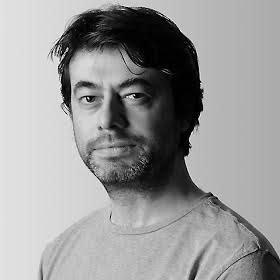Steve Aoki: "I thought about doing a rock album, but I need to be sure that the global sound of Steve Aoki is represented"
The DJ/producer on getting his start with a Tascam PortaStudio, throwing cake, and his foam pit trampoline room
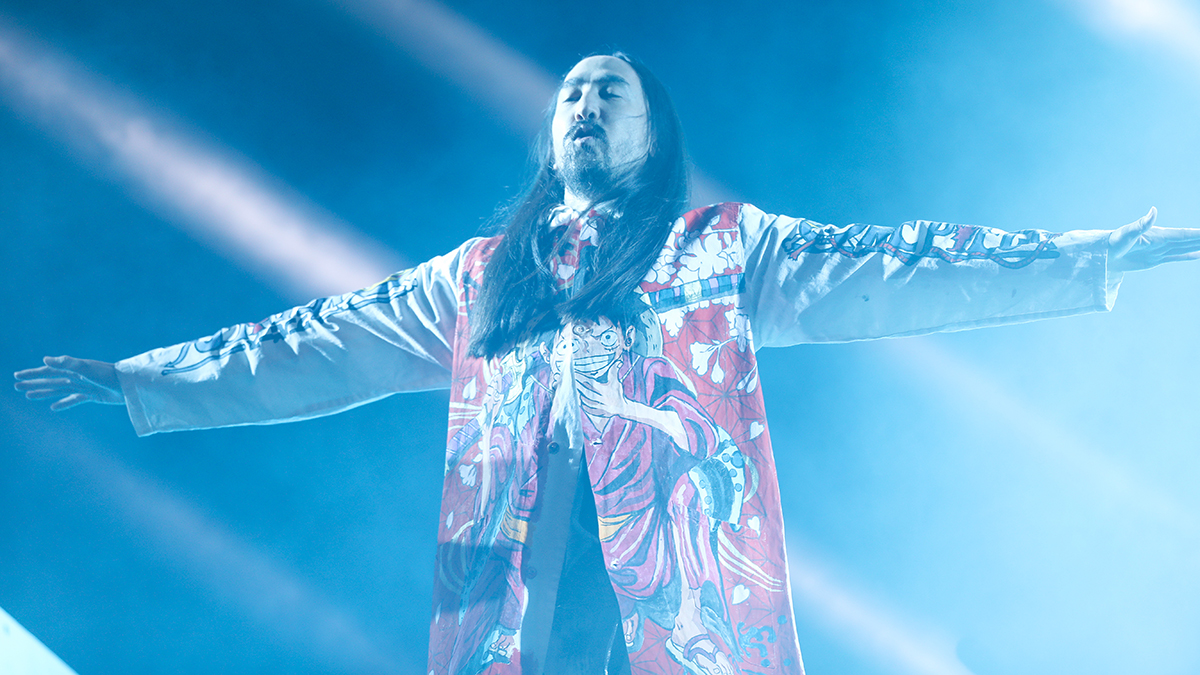
The man. The legend. The hardest-partying superstar DJ on the planet and a one-man powerhouse of music production that just won’t quit. But when Covid struck, Steve Aoki suddenly found himself with a scrapped tour and time on his hands.
Rather than rest on his laurels as the world record-holding most-travelled superstar DJ, or waste time on pointless pursuits such as throwing cake around (heaven forbid), Aoki got in his ice bath and got to work on both a hardcore regimen of life-lengthening self improvement and a hard-hitting brand-new 26 track album, HiROQUEST: Genesis, which is out now.
We caught up with the man/the myth in his Las Vegas home-cum-resort-cum-studio-cum-foam-pit to talk production, collaboration, his favourite hardware and software and… cake.
Whereabouts are you right now?
“I’m at my home in Las Vegas. It’s my studio, my home, my resort. I have my whole ice bath, sauna, meditation room here. My house is like a compound. I have everything I need here. I never have to leave. It’s an introvert’s dream.”
Vegas isn’t known for being a very relaxing place…
“It’s kinda crazy, Las Vegas is the city of sin and everyone comes here to go big and party hard. I do 40 shows a year here but then I drive 20 minutes off the strip and I can zen out, be creative and keep the music coming and the culture moving forwards.”
Want all the hottest music and gear news, reviews, deals, features and more, direct to your inbox? Sign up here.
How’s the promo for the new album going?
“Man, it’s been insane. We pre-sold 30,000 CDs which is crazy. Who buys a physical CD any more? But we put these trading cards in there and people have been obsessed with them. We’re just trying to find different ways to create a world to tell a brand new musical story. This one started in Covid, in a time where I was stuck at home, so all the inspiration came from a different place.
“I came up with the name HiROQUEST - Hiroyuki is my middle name - and we created 64 characters and put them on trading cards and we put them in the CDs to introduce what the HiROQUEST world looks like as a trading card game. And they went crazy. Boom, we sold all 30,000 CDs in five hours. And now on eBay you have cards selling for $500, and it’s an $8 CD.”
How was the lockdown for you? For someone who tours so much, what was it like being at home?
“During Covid I was in my studio all the time. I didn’t have a deadline. I didn’t have a show to go to. I didn’t have all those things that I normally have to do. So I thought ‘Well... Let’s jam,’ and I picked up my Strat.”
So it was a creative time for you?
“It was very abrupt. I was on my Neon Future 4: Colour of Noise tour. We were one week in with six or seven weeks to go.
During lockdown I thought ‘Well... Let’s jam,’ and I picked up my Strat.
“When we do these bus tours we bring a lot of people out on the road. There are probably about 50 people on the payroll who are travelling with us. Buses, semi-trucks, engineers and tech people to set up the stage. It’s not just a six-man crew flying in and out which is what I usually do, and we were pulled off after the first week.
“We didn’t know what Covid was back then. So I just worked out every day and it was 15 days to the album drop and then we were going to be back out on the road and it was all going to be great. [I thought] ‘I can’t have my album out when all my shows are shut down!’ I didn’t understand what Covid was all about but - boom - I was like ‘this is some serious shit. This is some scary shit.’
“But when I realised ‘this is it’ and we’re stuck at home and this is how it’s going to be I went back into an academic mode. I’m home. I need to learn. I wanted to switch gears.
“I got really into finding my balance after my crazy life on the road. I got a really good regimen of mindfulness. I was doing ice baths here and there… Now I was doing it daily… I was doing breathwork here and there… Now I was doing it twice a day. Mediation? Sauna? Heat exposure? Twice a day. And spending time with my family and on-boarding them into that space. That was a lot of fun.
“And I got really big into collectable cards and NFTs. TCGs like Pokémon, and I started my own TCG called Metazoo which eventually became HiROQUEST. I love combining all my different worlds of passion into music. It’s what I did with Neon Future with my obsessions of science and longevity and science fiction turning into science fact. HiROQUEST is all about bringing a whole new world of characters and storytelling and world building alongside the music.”
HiROQUEST has a real band sound to it. It’s dance, but there are a lot of rock influences on there.
“The album was originally going to be a full-on alternative album. I made over 100 ideas so that’s why there’s 26 tracks on this album. The hard part was figuring out what’s going to make the cut.
“My Rolodex is very broad and diverse. I did a hip-hop album so I thought about doing a rock album to change it up, but I thought no, I need to be sure that the global sound of Steve Aoki is represented. The Latin sound of Steve Aoki is permanent. It’s part of my culture so I needed to ensure that the Latin sound and hip-hop were there. I have a great group of hip-hop artists I like to work with. And the country song, with the harmonica and the stomping line-dance drums… I wanted to dive into other stuff and, of course, I have to have the EDM tracks and straight pop, too.”
Did you record the album at home?
“Yeah. The great thing is that my house is my studio. It’s a fun place to work. Artists love coming here. I have a foam pit trampoline room, I have a pool jump. I have all these different fun things going on, so when they come here they have a completely different experience. We did the whole thing in my Neon Future cave.”
What’s the process in putting a track together for you? Do you work alone or in collaboration?
“Generally for me I start working on music alone. I come up with a bunch of ideas and then I start fleshing them out with some of the producers I work with. It’s definitely collaborative. For this album every track is a collaboration except for Black Pullet and HiROQUEST Anthem which are EDM records I worked on myself.
“My house has been like a songwriter camp. I host these camps where we have different writers and producers come through, different musicians, ‘cos a lot of the time I’ll play a guitar line and then I’ll bring in a guitar friend of mine who is insane. I’m like ‘You play it. Let me hear your take’. It’s the same with drums. I’ll come up with some fills but then I’m like ‘Let me hear you do it!’”
Are you into gear or is it all just a set of tools for you?
“If you’d asked me ten years ago then, yeah. But for the last ten, 15 years I’ve been touring a lot. The gear I have in my studio is sacred for me because it works so well. I’m a very efficient producer. I just use things that nail the sound and get things done quickly.
I’m a very efficient producer. I just use things that nail the sound and get things done quickly.
“My desk is insane. Aesthetics for me is a big thing. All the studios I go into have a certain look. They’re dark, moody. Mine is completely opposite. Mine is really bright. There are no clocks, it’s like the Las Vegas effect. I’ll be there at 3am and I don’t want to feel like it’s three in the morning.”
Are you a daytime or a nighttime guy?
“Honestly, when I’m working it’s like every time! I just hunker down and do two weeks straight, day and night, of music. My bedroom is right above my studio. The bass leaks out, but it’s fine.”
What kind of gear have you got in there? Tell us about that desk.
“It’s a custom desk. It’s one of the first things I put in to make it feel futuristic and like you’re being transported into the future. I worked with Steven Slate on it. It’s a Raven Slate desk.
“I have three monitors [displays], one main and I use a large one above that so that guests in the room can see what’s going on. I use a UAD Apollo 16. It’s saved a ton of room as I use all the software versions of the classic racks. The hardware emulation that UAD has done for those plugins is the best in the game, for sure.”
What are some of your favourites and what do you use them for?
“Some of my favourites are the Teletronix LA-2A [levelling amplifier] for vocals and the Oxford Inflator on the master chain. It just helps in making the mix louder. The Pultec EQ - that’s really great for boosting high-end frequencies on individual tracks or buses. Low-end processing, I’ll use Brainworx bx_subsynth.”
There’s a great reverb you use on most of the tracks. It really glues things together.
“That’s the Valhalla. That’s my go-to. I’ve been using that forever. It just nails it with that sound.”
Do you have hardware, too?
“I have a synth wall. Most of the time I work in the box. Especially out on the road. I think with this album in particular I did end up toying with the synth wall more because I was having such fun in the studio. I bought the [Sequential] Prophet about five years ago and it’s fun to finally have time to play with your toys. It’s a gorgeous synth. I don’t know which number it is but it works and it does its job.
“Some of my older synths I don’t use but I can’t get rid of. My Nord Lead 2 was the first synth I ever got. I remember in 2003, Pharrell [Williams] and Chad Hugo, The Neptunes, they were cranking. They were my favourite production team. I remember Chad with that red Nord Lead 2 in the videos and I was like ‘I need to be like Chad!’ He’s Filipino of Pacific Island/Asian descent, so when you have someone who represents a culture that relates to you, it gives you this drive and aspiration. He’s up there as one of the best producers and I ended up meeting him and we became friends. But that Nord Lead 2 stuck in my mind and was the first synth that I bought.
I bought the [Sequential] Prophet about five years ago… I don’t know which number it is but it works and it does its job.
“Then there’s my Virus TI, that’s one I’ve had forever. And I have a whole Roland section because I work with Roland. They sent me a bunch of gear. I have a TR-8 drum machine that’s awesome. That’s a great piece of gear. The Roland System-8 - I get so much utility out of that one - and some fun tinkering toys like the Roland E-4 voice tweaker for fucking around with your voice. I like to have fun with that. We can create a beat and somebody can get on the mic and make some fun shit. It’s more for jamming really, just breaking away and having fun.”
How do you get those Aoki-style big synth leads and basses? What’s your go-to for those?
“My go-to is Serum. Serum and Spire. Those two are definitely favourites. And Sylenth1 is one that I’ve used for many many years. Pursuit of Happiness we remixed back in 2009? That [sings] bahhhh, bahhhh, bahhh, baaahhh! That’s just a preset. That’s just the sound, straight. Back then I was like ‘this sounds fine’. Now if you hear a preset, of course you’re going to tune it up a little bit, but sometimes it’s that simple.
“Steve Duda. He killed it. He knows sound. He’s the master sound designer. I’ve geeked out with Steve on some stuff but shout out to him for creating Serum. He did Cthulhu with Joel [Deadmau5] and he’s an insane sound designer. I remember using Cthulhu and that was great for creating insane weird chords. Those are my main synths, for sure.”
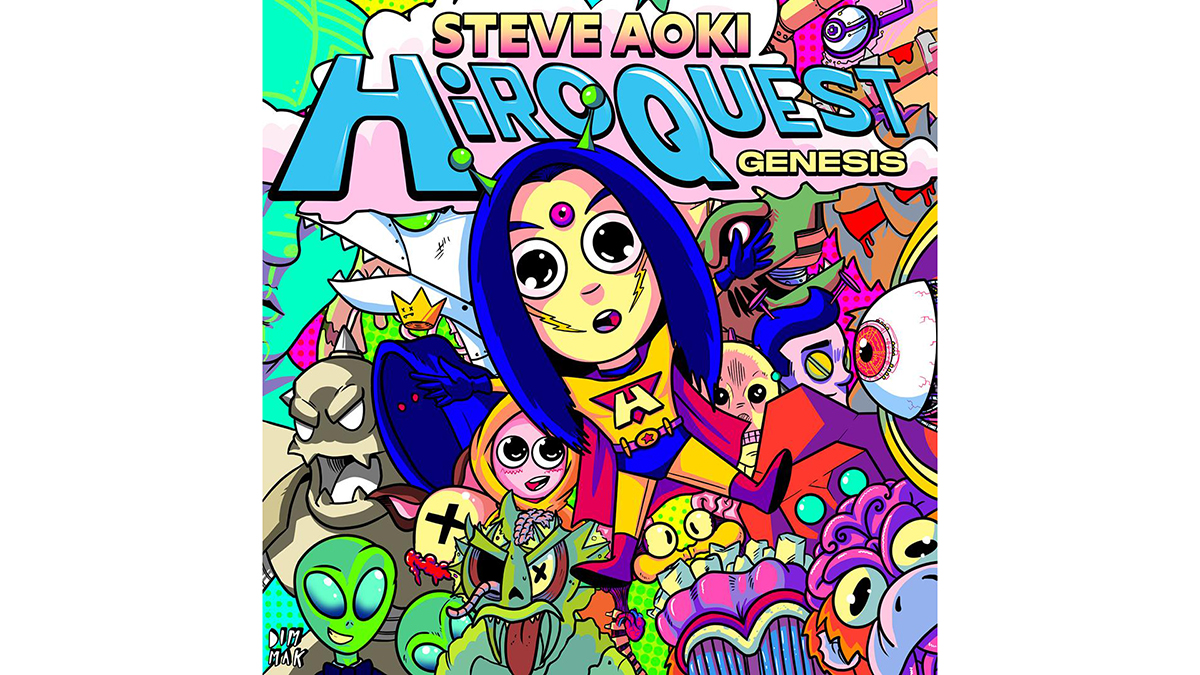
It’s ten years since your first album, Wonderland. How have your production techniques changed since then?
“From 2008 to 2012 I worked on that album, my first studio album. It was Sylenth1. That was my main VST for sure. And Ableton has always been my DAW, but I started out in Reason. My first productions are under a different name that I’m not going to tell you. I don’t want anyone to hear it because it’s so fucking bad! I made the whole beat on Reason and I sang on it. That was back in 2000.
“When I was in bands back in that era, I got a computer and I heard about Reason. I thought ‘Let’s see if I can make a beat,’ and I made a beat. And then I sang on it. And then I thought ‘Hey, I’m just gonna release this’. And back then it was on a CD. Because there was no digital back then.”
What was your studio like back then?
“I was pretty much in the box. The laptop is my best friend. I’ve never had a home computer. Always worked off a laptop. I can’t imagine a DJ not having a whole production setup on a laptop, because we move.
“The great thing about the agility and manoeuvrability of DJ life is that you can work on an idea and you can play that idea out with a vocal sample on the breakdown and you can see how it reacts. And you can be like ‘Oh, I’m tuning this thing up tonight.’ I think with bands and pop stars, they can’t just do that. DJs can do that.
I’ve never had a home computer. Always worked off a laptop. I can’t imagine a DJ not having a whole production setup on a laptop, because we move.
“It’s kind of a treat for the audience ‘cos you know 100% that this is going to get changed. So this is only for you. Nobody is ever going to hear this again!”
You’re known for your great collaborations. How do you work that? Do you take control? Are you like ‘the director’ in the studio? Or do you sit back? Let them do their thing?
“Every session is different. There’s no script. It’s just vibe. For me it’s all about the human to human connection outside the music. If I’m in the studio with someone we’re going to vibe. We don’t even have to talk about music. It can just be about what we’re going to do for the day.
“The great thing about my house is that it’s so much fun. Before we get to the studio we’re jumping into the foam pit. We’re bouncing on the trampoline. And if they’re brave enough they’re going to jump 25 feet into my 16-feet-deep pool.
“And then if you’re even braver you’re going to jump into an ice bath that’s at 38 degrees fahrenheit [3.3 degrees celsius]. I’m gonna wake up the endorphins in your brain! Get your cells fucking screaming! And the process in your head is gonna change. Guaranteed.
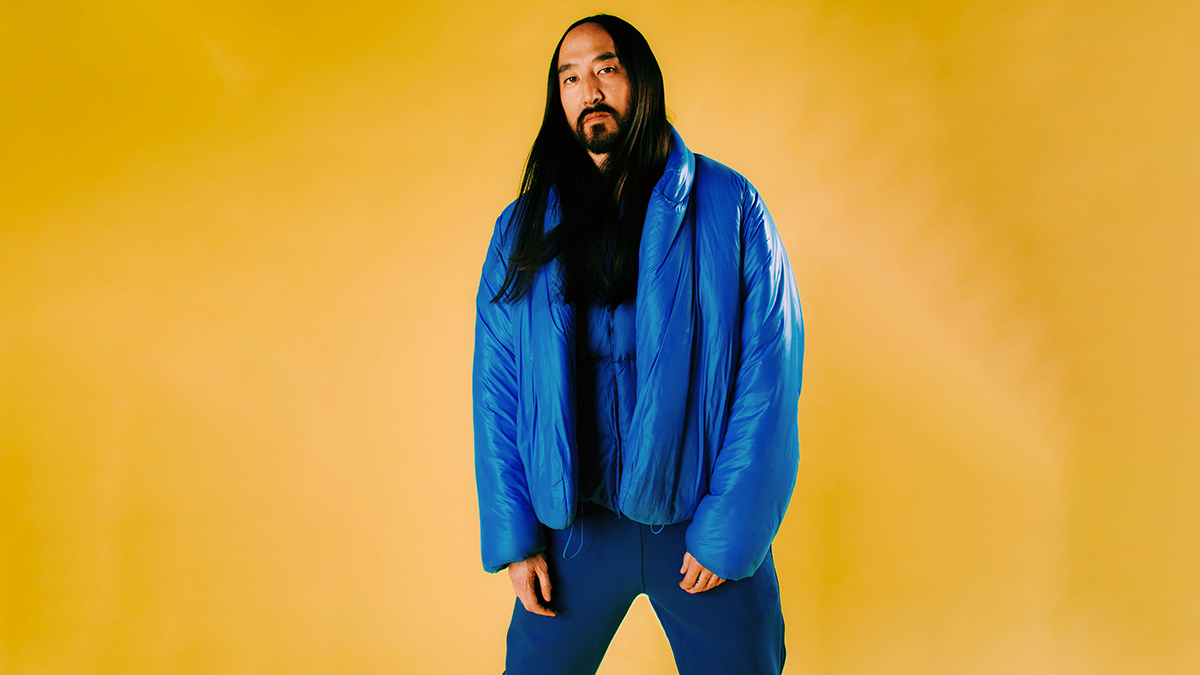
“How you think about a melody… Any creative process you have is going to be very different, and iterated, when you step into my studio. I love people coming here.
“My album Colony, I worked the majority of the time in Atlanta, cos I was working with Migos, 2 Chainz, Gucci Mane, Little Yachty cos it was a hip-hop album. But this album and Neon Future was all here. I wanted to make this creative haven that boosts all your levels to the peak.”
What’s the secret of a great session?
“I want it to be fun! And once the vibe is there and we’re in the studio then I start playing some ideas. And this is something I tell other producers. If an artist doesn’t know you, whenever you bring those artists in, you’d better make sure those first three tracks are bangers, because there’s a fatigue that happens. And this is where the DJ head comes in. The more you DJ the more you can look at a crowd and know they’re not feeling it and you need to take them higher. You’ve gotta be a DJ in that studio - understanding the people and the psychology of who’s in front of you.
“You don’t want to come in too loaded with music. You want to be free. You need to be open and speak the language that really speaks to their soul. Or there’ll be fatigue if you can’t get there and then you’re going to have a failed session.”
How did you get into music?
"Punk and hardcore. I was 14. In high school. One year younger than everybody else. In Newport Beach, California. An absolutely gorgeous city. But it’s a bit ignorant. 95% of Newport Beach is white. And whenever you have 95% of anything that smaller percentage is going to be misrepresented. There’s going to be some level of misunderstanding. So it was difficult for me to find my place. But the punk and hardcore kids, the skate kids, the mixtapes… I was like ‘Holy shit, this is speaking to me’. I loved it. I remember learning every song. It was a place where kids like me could hang out.
“And when a group is small and passionate like that you get contribution. You cannot be passive. You know, when a professor is talking to a big audience? They’re all passive. You get a lot of people who’ll do the bare minimum. But when it’s a small group of passionate people, everyone will contribute and that contribution will be significant and will have an impact. And you think ‘Holy shit, I have a purpose!’
“At that young age I was so lucky to find that energy and to pick up a guitar. And then I learned how to play the bass. And we all traded instruments and we started a band. By the time I was 15 I recorded my first demo playing drums, guitar and bass on my Tascam four-track recorder. That was one of the greatest presents my mom ever gave me. It cost 600 bucks. And I was able to be creative.
“I was always in bands but I knew I needed to learn how to produce. So I hired a guy off Craigslist and I got him to teach me Pro Tools. Up until then I did everything in a live room studio and I just recorded like super ghetto back in the days.”
So we see a lot of big DJs. What is it that you bring? What makes a Steve Aoki show different?
“That’s the exact question I ask myself! ‘What is it that I can do differently?’ I’m glad you asked that. We all want to do something that’s memorable… The Flaming Lips! A Flaming Lips show is a Flaming Lips show! Wayne Coyne jumps in a floating ball and rolls around in the crowd! No one else could do what Wayne Coyne and the band can do. And I want to make sure then people leave my show they say ‘Man, that was a fucking amazing show!’ And ten years after that I want them to say ‘Man, that was a fucking amazing Steve Aoki show!’
By the time I was 15 I recorded my first demo playing drums, guitar and bass on my Tascam four-track recorder. That was one of the greatest presents my mom ever gave me. It cost 600 bucks. And I was able to be creative.
“So how do you do that? You think about all the things that set you apart. And some of those things are very stupid, silly shit… Like throwing a cake in someone’s face. That was one of many bad ideas… And I’m trying to think of more!”
“I used to bring an inflatable liferaft to my shows and jump in the liferaft and go all around the crowd. That was a Steve Aoki thing. But the cake… The cake has lasted the test of time! It’s been an incredible journey with the cake! I’ve caked over 20,000 people at this point and people fucking love it and I never get fucking bored of it and the crowd eats it up… Literally!”
So no desire to take it easy any time soon?
“Oh my God. I worked on 100 ideas over Covid. This is the start. This is Hiroquest: Genesis. I have a whole story to share with the world. This is the first part. I have so much more to offer.
“I’m 44 now and music is still driving in my veins. I’m still inspired to make and create. Work with artists. Get on the road. 200 shows a year - 15 years straight. I’ve toured all across the world. I’m in the Guiness Book of World Records as the most travelled musician on the planet in one calendar year.
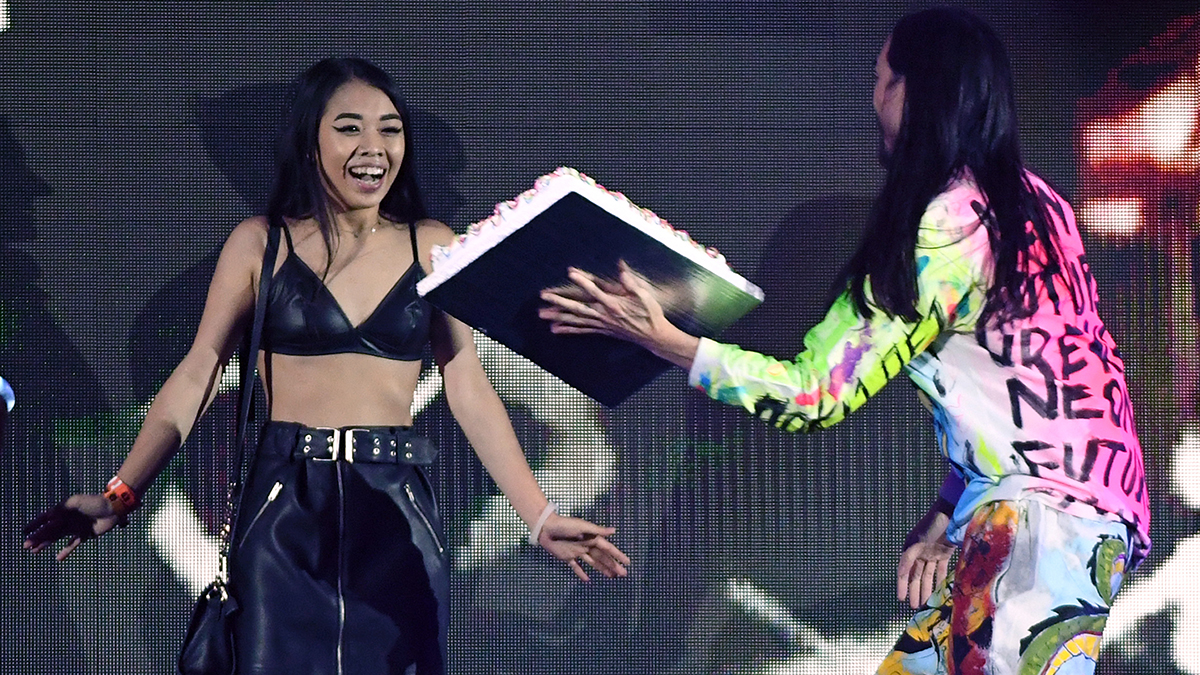
“The saddest thing I can share with you is that technically I only have 40 years left and that’s so fucking sad. I’ve cracked 2% of what I want to do with 98% still to go! I need to live ‘til I’m 600! Minimum!
“I’m not kidding. That’s why I’m obsessed by technology, AI, bio-tech, what we’re doing to extend human life and make sure we’re living optimally, making sure our brains are not degenerating into mush. I have a foundation that’s focused on brain regeneration, brain preservation. All things brain. The human brain is the most phenomenal thing in the universe.”
What’s coming up next?
“I was playing six or seven shows a week over the summer in Europe so right now I’m back and I like the schedule right now ‘cos I can sleep! I’m getting my sleep back and it’s fantastic. So I generally play just weekends right now and it’s so nice. But I have an Asia tour in October. And after that I’m going to start working on the second Hiroquest album. I already have the ideas down, I just need to start tuning them up.
So if this is HiROQUEST: Genesis, what comes after Genesis?
“We’ll see! I don’t know the title of the second album yet, but I need to figure out what songs are going to make it and I’m making new music all the time. It’s got to top the 26 songs on Genesis.”
Before we wrap, any advice for any upcoming DJs and producers?
“When you’re in a band you have three, four, five bodies all together in a room. It’s democratic. But when it’s up to you to get things done, you’re going to have to love what you do. It’s all self motivation. Self discipline.
“That’s what I tell young DJs and producers. Follow your heart - your passion will lead you. This is a life that takes a lot of time to develop. And as you’re learning the process you have to commit to it. Just like being a doctor or a lawyer, you’ll know in the first year if this is really for you.”
Steve Aoki's new album, HiROQuest: Genesis, is available now.


Daniel Griffiths is a veteran journalist who has worked on some of the biggest entertainment, tech and home brands in the world. He's interviewed countless big names, and covered countless new releases in the fields of music, videogames, movies, tech, gadgets, home improvement, self build, interiors and garden design. He’s the ex-Editor of Future Music and ex-Group Editor-in-Chief of Electronic Musician, Guitarist, Guitar World, Computer Music and more. He renovates property and writes for MusicRadar.com.
